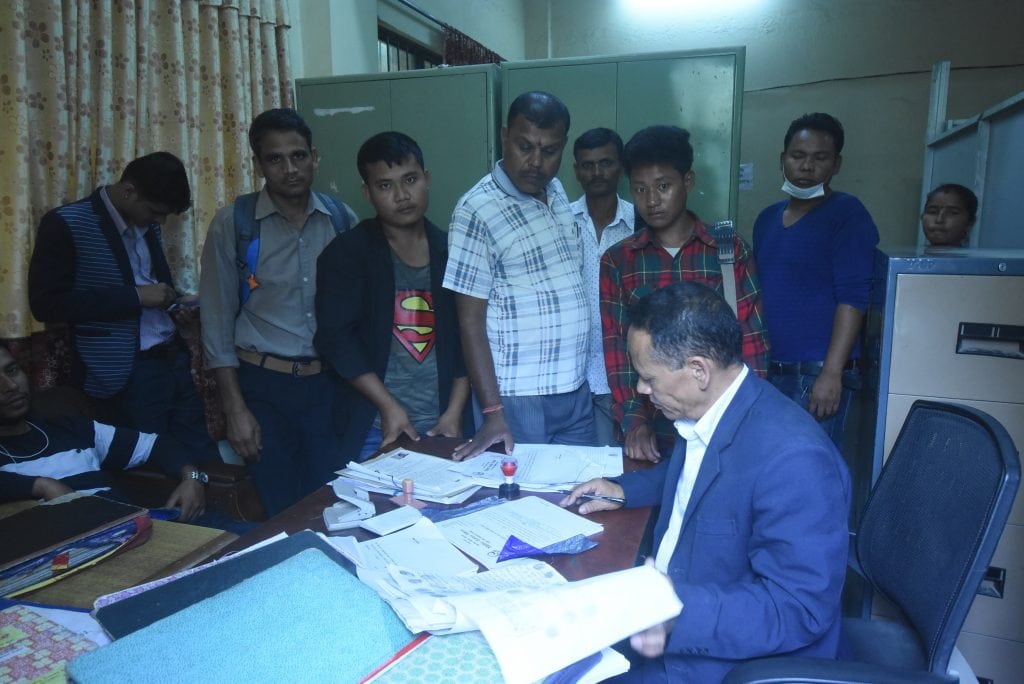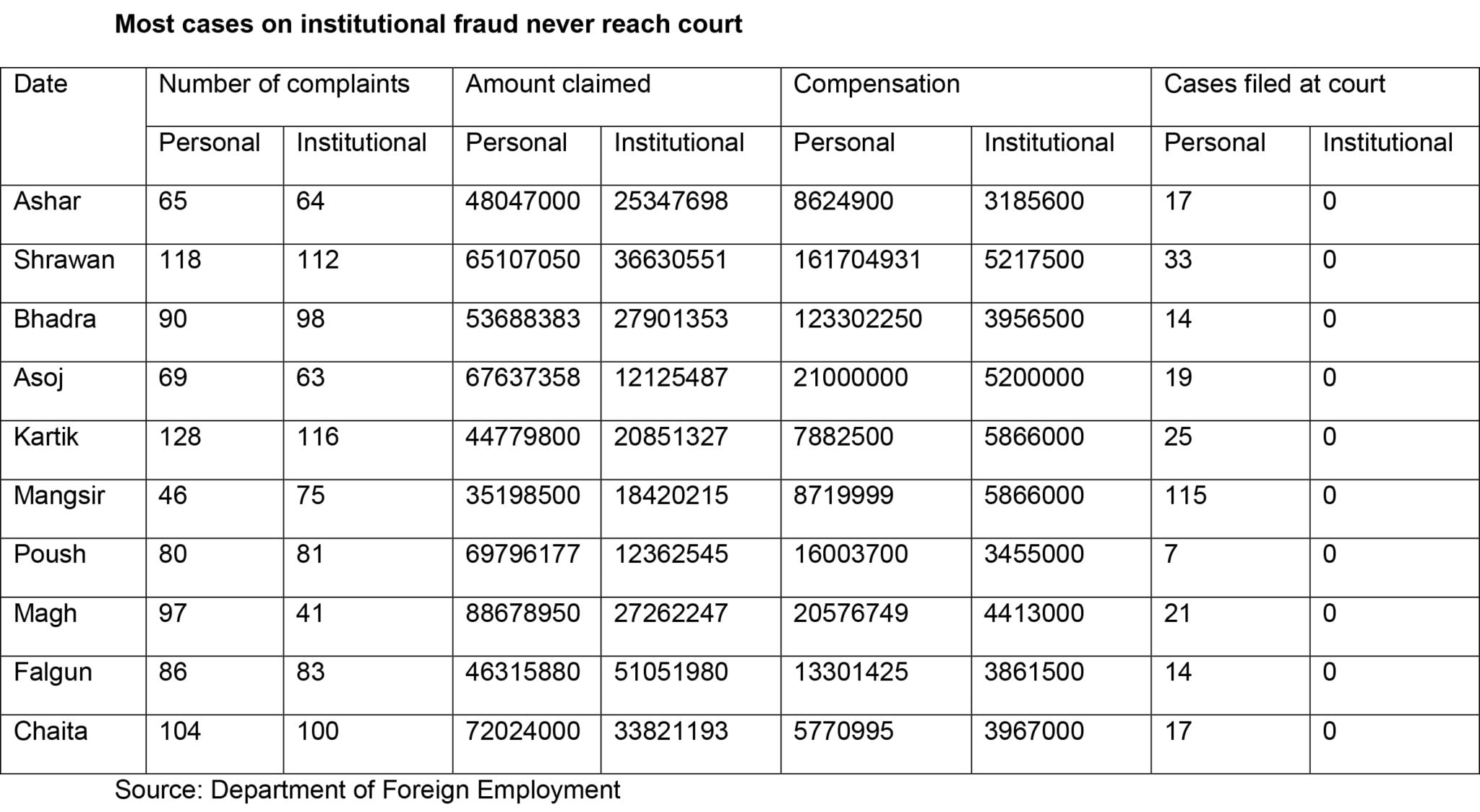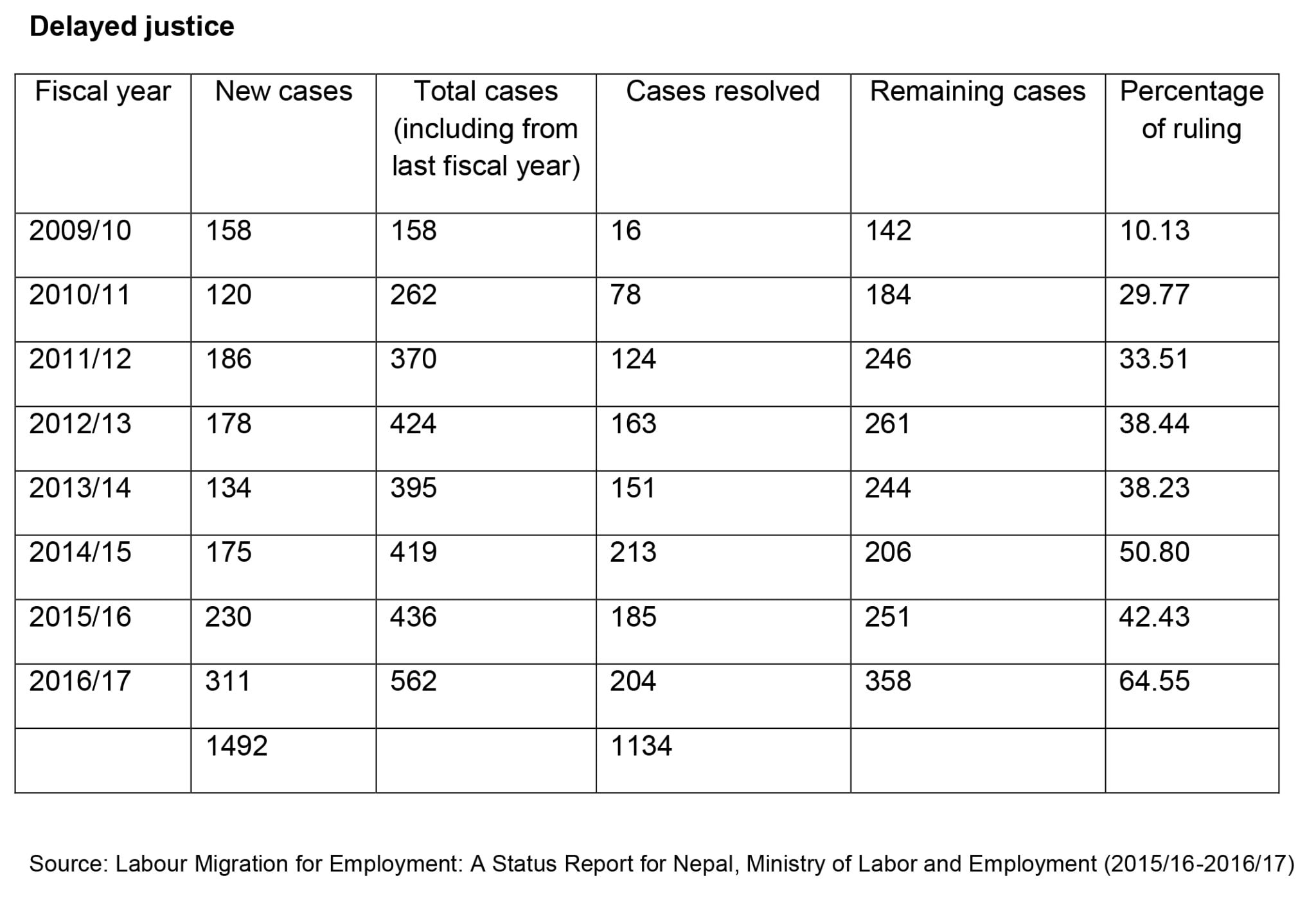Remittance is the backbone of Nepal’s economy, but the foreign employment sector has committed billions of rupees in fraud and left thousands of people stranded.
-Janak Raj Sapkota : Centre for Investigative Journalism-Nepal
In mid-March, soon after being appointed as minister of labor, employment and social security, Gokarna Bista unveiled a plan to reform the sector. The ministry took the initiative to facilitate daily hearing from people who have been exploited by foreign employment agents so that effective justice is delivered, the minister said. In a television interview soon after the announcement, he pledged that he would not backtrack from the campaign to reform the sector.
The widespread deception in Nepal’s labor recruitment industry is reflected in the cases where migrant workers face hurdles in getting justice, and the nominal justice system fails those who seek redressal. Whether Minister Bista will take effective steps to combat the exploitation or it will just fizzle out soon remains to be seen. But our investigation of the sector has uncovered some shocking findings.
-
- Some 658 complaints seeking a total of 856 million rupees in compensation have been registered at Kathmandu Metropolitan Police Crime Division in the last 22 months since mid-July 2016. In the same period, Central Investigation Bureau has received 35 complaints related to fraud in foreign employment, seeking compensation of 169 million Nepali rupees.
-
- Some 4099 complaints under personal permit and institutional permit seeking 1 billion 573.8 million rupees in compensation were filed at Department of Foreign Employment (DOFE). The fraud carried out by recruitment agents are called ‘institutional’ while cheating under the individual effort for foreign employment is categorized under ‘personal.’
In the last 22 months, Nepalese who dreamt of a job abroad have lost 1 billion 570 million rupees. In this period, the three offices have received 4792 complaints. One complaint is filed on behalf of several migrant workers. That means the number of victims could be around 12,000.
The statistics reveal that on average 545 Nepalese are cheated every month in their attempt to find job abroad. Every month, the total amount they lose because of fraud and foreign employment stands at 118.2 million rupees.
There are many more who settle the issue without lodging complaints at the DOFE or the police. Some don’t have access even to these offices. So the number of people cheated by the recruitment agents could be higher, according to insiders.
Elusive justice
Since mid-July 2016, the DOFE received 1814 complaints for cheating under ‘personal’ category. Of them, only 439 cases were filed at court. What happened to other 1375 cases? Officials of the DOFE said it doesn’t play any role in reconciliation between the parties but doesn’t interfere if they settle outside of it. In other words, aside from cases registered at the court, the DOFE has no answer to the question of what happened to them and whether the migrant workers were forced into a settlement.
The ‘institutional’ category has fared far worse than this. In the last 22 months, the DOFE received only 2285 complaints of fraud by recruitment agents under the category. Of them less than 3 percent or 52 cases were filed at the court. The DOFE, using its judicial power, helped find a settlement in the rest of the cases.
In such ‘game’ of settlement, the powerful recruitment agents rather always have an upper hand against the weak migrant workers. After running from pillar to post in a hope of justice, the migrant workers get tired and resort to settlement under the DOFE. They are forced to accept far less amount for compensation.
The following figures from the DOFE also illustrate the situation. In the last 22 months, the DOFE received complaints for ‘personal’ cases from migrant workers claiming amount of 872 million rupees, nevertheless the DOFE could fine only 199.45 million rupees. Similarly, the DOFE received complaints under ‘institutional cases’ from migrant workers claiming amount of 701.84 million rupees. But the DOFE could raise only 135.3 million rupees in fine. These figures show that only one third of victims receive the claimed amount of compensation.

Victims approaching Ram Kumar Thapa,Director, Foreign Employment department, for complaints. Photo courtesy : Ashok Dulal
The DOFE appears keen to settle the cases of fraud under foreign employment. It has formulated a system, where migrant workers registers complaints for being illegally charged for foreign employment and later, it facilitates settlement for them. On November 25, 2016, the DOFE formulated a working procedure to manage the victims’ complaints at the office so that they are cleared on time. Under the provision, the DOFE formed a reconciliation committee. Although a point of the procedure clearly says the complainants won’t be forced into settlement without his or her consent, another point limits the discussions on a complaint to three times. In other words, the procedure isn’t aimed at providing justice to the victims and punishing the perpetrators.
At the reconciliation committee, the victims, who are often weak and the recruitment agents or their representatives, who are strong, are invited to find a solution on the matter. The migrant workers, facing financial burden, appears weak. The DOFE officials, overworked and well aware of influence the recruitment agents could make, appear more interested in closing the case than providing justice to the victims. In such a situation, most victims agree to settle for lower compensation or even a fraction of the amount they were charged for foreign employment.
Babita Gurung, a migrant worker from Pokhara, is one such victim. On August 13, 2017, she flew to Cyprus after Trend Way Manpower, based in Panipokhari, Kathmandu, told her she would work as a housemaid in the country. But she was instead sent to work at grape and olive fields. She returned to Kathmandu 21 days later, angry at being cheated by the recruitment agent.
Gurung had spent 600,000 rupees for the job placement in Cyprus. So she visited the manpower agency soon after she came back. She filed a complaint at the DOFE after the agent told her she would receive only 100,000 rupees. The DOFE summoned the recruitment agent to its office. But the meeting was inconclusive. For two months, she travelled between her home in Pokhara and Kathmandu to claim compensation, spending money on travels. “There was no one at the DOFE who could raise my voice. So I had to agree on the settlement for 200,000 rupees,” she said. “I had to pay for my travel and interest for my loan. There’s no justice for someone like me,” she said.
The DOFE has failed to provide justice to victims because the DOFE is not exercising its authority, according to Krishna Neupane, a lawyer with People’s Forum, which provides legal aid to victims of foreign employment. “The officials interpret the law as they like it. They also bow down to the recruitment agents. That’s why justice for victims remains elusive,” he said.
If the parties fail to settle on a case, the DOFE sends it to Foreign Employment Tribunal. Only few cases are sent to the latter. Faced with backlog of cases, the Tribunal takes very long time to issue its ruling. According to Labor Migration for Employment: A Status Report for Nepal, published by Ministry of Labor and Foreign Employment, the Tribunal has resolved only a handful of cases. “Only 24 cases out of a total of 562 (including 311 new cases) registered at the Tribunal were resolved in 2016/17. Half of the cases at the Tribunal have remained inconclusive for years. Because of the backlog, new cases registered at the office further create workload at the Tribunal,” the report said.
But a vast majority of cases are never filed at the Tribunal. In the last 10 months, not a single case on institutional permit has been registered at the Tribunal. But in the last 10 months, 7025 complaints on institutional permit have been registered at the DOFE. That’s because the officials of DOFE have colluded with recruitment agents, according to Neupane, who provides legal aid to victims.
Bhuwan Acharya, Director General of the DOFE declined to comment on the issue. “I have only recently joined this office. I need to talk to my colleagues at Legal Section,” he said. During the current fiscal year, 769 complaints on institutional permit have been registered at the DOFE, according to its website. Of them, 718 were resolved while 27 recruitment agents were served injunction order in response to 51 complaints. Victims settled some cases outside the court, according to Shashi Lamsal, a DOFE spokesman.
The victims despite spending their time and money on the case, aren’t assured of justice because they lack evidences, said Lamsal. “Therefore, they go for out-of-court settlement,” he said. “That’s why only few cases reach the court.” The officials inundated with complaints, powerful recruitment agents and weak laws have helped perpetuate widespread cheating in foreign employment sector.
As a result, victims lose faith in justice mechanism. They seek resolution through middlemen. “As delivery of justice gets delayed, the risks for perpetrators minimize while burden on the victim increases,” said Neupane.
That’s why many victims end up agreeing to unfair deals. In the last 22 months, 658 complaints were registered at Kathmandu Metropolitan Police Crime Division. Of them, 224 complainants reached an agreement. Of the 856.9 million rupees claimed in compensation, victims received 249.2 million rupees.
The fraud cases that are unresolved in settlement are directed to the court through government attorney. “Most victims lack strong evidence to pursue their cases. So instead of facing legal hurdles, they agree to a settlement. They even hardly show up at the court hearing. Those who continue to pursue their cases become doubly victimized due to the delay in justice delivery,” said a police officer with experience on such cases at Kathmandu Metropolitan Police Crime Division.
Police are reluctant to register complaints related to foreign employment. Even if they register a complaint, in case of the complainant being a returnee migrant, the case comes under human trafficking and if not, it is filed as a case of cheating. The police have long demanded that they be given power to prosecute the accused. The police want to take over the prosecuting power for cases related to foreign employment and set up a unit to oversee it. Dibesh Lohani, who earlier served as SSP at the Division, had lobbied along the lines to home minister Janardan Sharma.
Education consultancies eye migrant workers
Migrant workers not only fall prey to recruitment agents; educational constancies and their agents also cheat them. A growing number of them promise people attractive jobs in Europe and the United States, only to trick them later.
The consultancies work in the guise of educational adviser, but they are so adept at running the fraudulent business that as soon as victims complain against them, they seek stay order from the court. In the last 10 months, Kathmandu District Court and Patan High Court have issued stay order in 56 cases registered at the Division. Among them, 7 cases were related to cheating under foreign employment. Two consultancies were involved in the cases.

On September 8, 2016, Kathmandu Metropolitan Police arrested Pritam Khadka, who ran Brain Speed International Education Consultancy in Bagbazar. Two days earlier, five people had lodged a complaint against Khadka. In their complaint seeking justice under human trafficking, Tara Prasad Malla and Indra Dev Chaudhary claimed Khadka had illegally charged them 2.78 million rupees to travel to France. But they ended up in Singapore. Miran Rai, Ram Janam KC and Sagar Gauli had paid him 4.31 million rupees for a travel to Canada and France, but Khadka had cheated them.
Khadka’s brother Bharat took Tara and Indra Dev to Singapore via India, but left them stranded in the city-state. A month later, they returned after their relatives bought plane tickets for them. Miran and Ram Janam spent a month in Shanghai before returning home.
After Khadka’s arrest, the victims visited the Division. The two sides discussed the matter. Khadka signed a document pledging to hand cheques to the victims. But he registered a case against the victims and the Police Division at Kathmandu District Court, claiming that he was made to sign the papers under threat. He also sought an injunction from Patan High Court. At the High Court case, he had claimed the Division and victims could implicate him on banking offenses. On October 10, 2017, the Patan High Court issued an injunction ordering the Division and victims to present a written statement within 15 days and not to arrest Khadka until the case is clear.
The reason they seek injunction is it delays the ruling. It also makes victims tired and forces them to agree to the perpetrator’s conditions. After the court injunction, the victims have to hire lawyers to present their statements at court. This in turn incurs additional financial burden on victims. They face legal hurdles in getting their money back. “Injunction is a handy tool for those who want to delay court ruling and are on the run,” a police officer said.
Raj Kumar Thapa, who had just graduated from college, recently received a phone call. He had left his phone number at an educational fair. Manoj Bhandari invited him to Green Emerald Education Foundation in Baneshwar, where he met with its head Prithvi Bahadur Chand. Chand promised him a scholarship. According to his suggestion, Thapa on January 19, 2017 deposited 700,000 rupees to enroll at Sevenan Business School in Czech Republic. Thapa was told his money will be returned in case he wasn’t enrolled or he was refused a visa.
But Chand failed to fulfill his promise. A while later, it came to light that a dozen students had been cheated for a study in the Chez Republic by the consultancy. Shrawan Gautam was one of them. He had deposited 3700 Euros to the college’s account. Around 10 students who had paid the consultancy 10 million rupees registered a complaint at the Police Division. But on January 16, Chand filed a case at Kathmandu District Court seeking injunction against 10 students including Raj Kumar and Shrawan.
Chand claimed the students had themselves selected the college and deposited the money and were threatening to obstruct his business. The next day, the court issued an injunction, blocking the arrest of the petitioner.
A police officer at Kathmandu Police Range said as soon as they launch an investigation into fraudulent actions of consultancies, they seek an injunction from the court. According to him, the accused have used the injunction to flee the country, destroy evidences and earn interest from the victims’ money. “After they realize of being cheated, victims try to get the money back. If it doesn’t work, they search for middlemen for help. Having failed in both attempts, they visit the police. But such cases become weak due to lack of evidence,” said DIG Pushkar Karki, the head of Central Investigation Bureau. “Those who cheat in the guise of foreign employment quickly destroy the evidences. They don’t do transaction through banks and use forged documents.”
Pushed deeper into poverty
On June 22, 2017, Kathmandu Metropolitan Crime Division arrested Lok Bahadur Shahi, former General Secretary of All Nepal Football Association (ANFA). Shahi, who ran Sports for All Club in Darbar Marga, was accused of swindling 20 million rupees from 20 people promising them to send to Canada. He had forged fake IDs and fake certificates for sports awards with a plan to traffic the men as players for a football tournament in Canada on May 15-25, 2017. After Shahi failed to obtain visas for the trip, the victims registered a complaint at the Division. On July 10, 2017, the police filed a charge sheet against Shahi at Kathmandu District Court. On July 16, the court sought a 1.5 million rupee bail from Shahi. He failed to bail himself out. So Shahi spent three months in jail and was released on September 10, 2017 after depositing the bail. But the victims are yet to get their money back.
On November 16, 2015, Foreign Employment Tribunal found Hari Bahadur Pandey, a permanent resident of Tandrang Taxar of Lamjung district, who ran Welcome International Education Foundation Pvt Ltd in Kathmandu, guilty of fraud in a case related to foreign employment. Pandey, who didn’t have permission to send migrant workers abroad, had promised a few people to send to Papua New Guinea and charged them 2.745 million rupees. The Tribunal issued its verdict, imposed him a fine of 2 million rupees and a two-year jail sentence. Pandey escaped after the verdict. Officials of Central Investigation Bureau arrested him in December 2017 from Bansbari in Kathmandu. He was sent to jail in Dillibazar, but the victims have yet to get their money back.
 The victims of fraud under foreign employment don’t want to knock the doors of the court. The victims get justice in very few cases filed at the court. Even if the case is registered after a long struggle, it takes years for the court to issue a ruling. This pushes the victims, who have taken loan with high interest rates, deeper into poverty.
The victims of fraud under foreign employment don’t want to knock the doors of the court. The victims get justice in very few cases filed at the court. Even if the case is registered after a long struggle, it takes years for the court to issue a ruling. This pushes the victims, who have taken loan with high interest rates, deeper into poverty.
Diwakar Sapkota, a resident of Sunwal-7, Nawalparasi, is among the victims. Sapkota and his friend Hem Prasad Khanal with the help of the former’s acquaintance, were introduced to Man Singh Lama of Hercules Executive Pvt Ltd. After Lama promised the two jobs with a salary of 700-1000 Euros, Sapkota paid him 640,000 rupees on January 7, 2017. They were required to pay him a total of 1.2 million rupees. So Sapkota deposited the rest on his bank account. Khanal paid Lama 1.2 million rupees in cash. Then, the two, who had studied up to grade 8, left for Turkey. There, they found out that their monthly salary for a 12-hour daily shift was 1000 Lira (26,300 Nepali rupees). They realized they would not be able to pay the loan even after working for years. They decided to return home and asked Lama to arrange for the travel.
Lama again promised them to send to another country and arranged for their stay in Turkey through a local agent. They stayed in Turkey for 52 days, pretending to be Pakistani Muslims and worked at restaurants. But neither could they return home nor could they fly to another country. One day, the two were crammed into a vehicle and driven for four hours. They were not told where they were being taken. At the sea, they boarded a ship. After eight hours in the sea along Greek shores, they reached a small town called Simali. The two found themselves among 24 people; everyone was a Pakistani except the two.
The rest were allowed to leave after they paid agents. But the two were detained for 12 days. They were made to live in a congested space where it was difficult even to stand, according to Sapkota. As living there became unbearable, they escaped from the place. After spending five days on the streets, they found a local office of International Labor Organisation, which repatriated them to Nepal.
In Kathmandu, they registered a complaint of fraud under foreign employment against Lama at Metropolitan Police Crime Division. The Division arrested Lama and handed the file to Metropolitan Police Range to file the case. At Kathmandu District Court, a case of fraud was filed against Lama. On November 20, 2017, the two were subpoenaed to testify before the court. Then, Lama offered 3 lakh rupees to each victim. But the two said they wanted half of 1.2 million rupees at the time and a signed document to pay back the rest. Lama didn’t agree to it. Then, the court ordered to continue Lama’s detention.
The two don’t know when they will get justice. Sapkota was saddled with further 6 lakh rupees in debt. He’s now burdened with a 3 % interest for 1.6 million rupees, which has deepened his poverty. The father of two is planning to sell his only property–a small plot of land. He is saddled with a monthly interest of 36,000 rupees. “Dream of a job abroad has made me a nowhere man,” he said.
High profile accused released on bail
On February 8, 2018, Nepal Police’s Central Investigation Bureau arrested actor Rajendra Khadgi. He had been arrested following a tipoff from South Korean Embassy in Kathmandu after 11 ‘actors’ he took to the country to shoot documentary and drama failed to return to Nepal. The police had filed a case against Khadgi under human trafficking, claiming that he had taken from 1 million to 1.5 million rupees from each victim. But Kathmandu District Court released Khadgi on a 500,000 rupee bail.
On June 9, 2016, Kathmandu Metropolitan Police Crime Division arrested Chetan Raj Giri, vice president of Nepal Taekwondo Federation, on charges of fraud. He was accused of taking fake players to participate in international tournaments and returning to Nepal after leaving them in the host countries. Giri had used fake IDs of International Taekwondo Federation and cheated three men. He charged 700,000 from Rajendra Dawadi of Chitwan, 100,000 rupees from Tek Prasad Lamgade of Myagdi and 260,000 rupees from Deepak Sunar.
When the police raided his office in Tripureshwor, they found photocopies of 50 passports and fake IDs of International Taekwondo Federation. Giri, who served as a referee in Taekwondo World Cup in New Zealand, China and Canada and held the position of General Secretary of Rugby Association, was released on an 8 lakh 50 thousand rupee bail two months later.
Manoj Bahadur Singh from Imadol, Lalitpur, has also been accused of fraud under foreign employment. Known by various aliases including Raja Babu, Anup Singh, Pilot, Vice President of Hindu Prajatantrik Party, Nepal, he promised young people a trip to western countries as part of a ministerial delegation. He charged Binod Sewa of Shankarpokhari, Parbat 2.9 million rupees for a trip to the United Kingdom. He swindled nine hundred thousand rupees from Santosh Katwal, a Kathmandu resident, for a visit to the United States. After receiving the money, the man used to be unavailable. He swindled 40 million rupees from 29 people, promising them to include in a ministerial delegation to the US and UK.
Singh’s modus operandi was different. On June 4, 2017, he sent an invitation for a passport distribution program at Imadol, in which he had listed Deputy Prime Minister, Labour and Employment Minister and Commerce Minister as guests.
He was also named in the case against Ashok Kumar Karanjit, who was accused of charging 9.3 million rupees for foreign employment to seven people including Ram Kaji Shrestha, Pre Kumar Shrestha, Bishnu Gautam, Kamal Gautam, Krishna Kanta Gautam, Rishav Gautam and Harsha Man Gautam. Singh was also booked under Arms and Ammunition Act. The latest case against him involved raising huge amount of money from aspirants for jobs at Nepal Police. He has been under detention at Nakhu prison since January 1, 2017.



